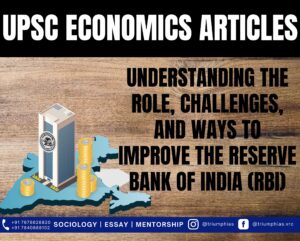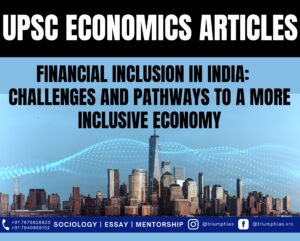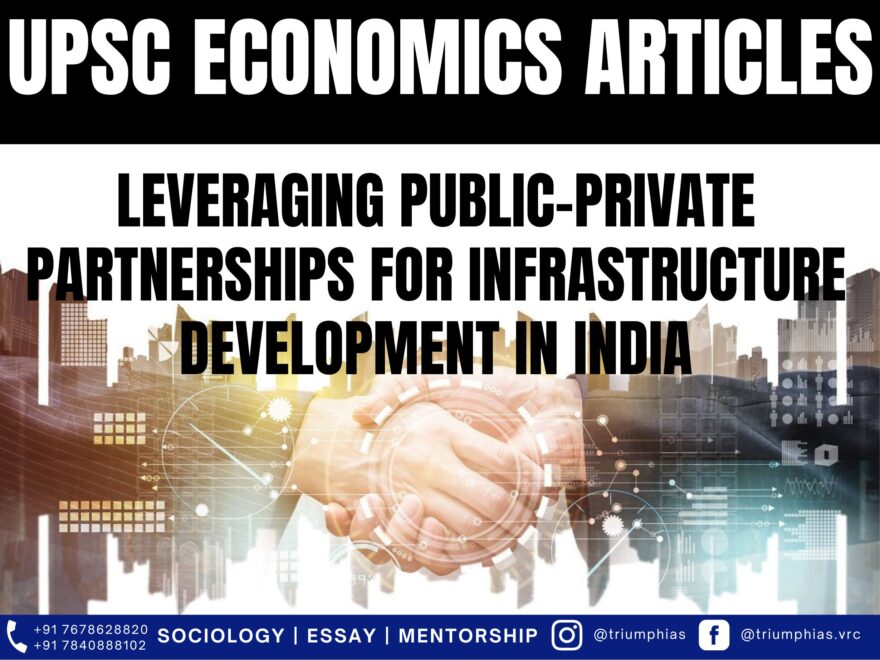Public-Private Partnership
(Relevant for Economics Section of General Studies Paper Prelims/Mains)

Public-Private Partnership
Sufficient investment in the development of infrastructure is essential to facilitate greater economic growth. Closing the gap in infrastructure, the Eleventh Five Year Plan (2007-2012) placed significant importance on boosting investments in physical infrastructure. Moreover, the plan employed a tactic of promoting greater private investment in infrastructure, both directly and through collaborations between the public and private sectors, known as public-private partnerships (PPPs).
A Public-Private Partnership (PPP) is a long-term contract between a private party and a government entity, for providing a public asset or service, in which the private party bears significant risk and management responsibility.
Public-Private Partnerships (PPP) are quintessential
- To rejuvenate and enhance the effectiveness of infrastructure projects through extended collaborations between the public and private sectors.
- To establish a governance framework that facilitates fairness, transparency, and competitiveness in procurement and industries.
- To adopt a unified and strategic approach to communication, garnering widespread support from diverse stakeholders.
- To leverage expertise and effectiveness in terms of human resources, technology, and innovation.
- To attract funding from various international organizations such as the World Bank and the Asian Development Bank to ensure quality service delivery.
- To implement risk-sharing among private participants.
- To incorporate capacity-building and improved regulation for new ventures.
- To standardize crucial interpretations and investment processes across various channels.
The ever-increasing growth in population has imposed tremendous pressure on State resources. In this situation, a public-private partnership (PPP) can offer a solution to resource scarcity by taking an associated risk of infrastructure. However, there are some challenges that need to meet, to have a strong PPP Model in India.
- Revision of existing Model Concession Agreements (MCAs): Time and again, concerns have been voiced about the inflexibility of the MCAs. For instance, existing contracts tend to prioritize fiscal advantages rather than effective service delivery.
- Enforcement and monitoring of Concession Agreement terms: There has been instances where project authorities fail to fulfil their contractual obligations promptly, resulting in additional costs for private sector participants.
- Resolution of disputes: Infrastructure projects often face disputes that lead to prolonged delays due to slow dispute resolution processes. Challenges related to infrastructure financing: Some major issues include numerous projects being stalled or delayed, causing many bank loans to turn into Non-Performing Assets (NPAs) and restricting further bank lending to infrastructure ventures.
- Availability and quality of technical data: New projects encounter technical challenges, making it occasionally challenging for new entities to comprehend. Influence of vested interests on skewed qualification criteria: This results in subpar quality in the investment process.
- Fiscal uncertainties: The Indian economy experiences fluctuations in different sectors, which doesn’t provide a steady fiscal viability for new investors.
The success of Public-Private Partnerships (PPP) to a significant extent relies on optimal risk distribution among stakeholders, an atmosphere of trust among stakeholders, and robust institutional capability for grooming and executing PPP projects. With the need to cater to a growing population, there is a pressing demand to expedite the inflow of private capital into the infrastructure sector.
Further, there is a need for implementation of some of the key recommendations of the Kelkar Committee Report including setting-up of national level PPP institution, a dedicated PPP tribunal, and a formal framework for post-award contract renegotiation. A mature PPP framework, along with a robust system shall enable the Government to accomplish the dream of a vibrant economy.
Sample Question for UPSC Sociology Optional Paper:
- Question: What is the sociological importance of Public-Private Partnerships in India’s infrastructure development?
Short Answer:
From a sociological perspective, Public-Private Partnerships (PPP) in India’s infrastructure sector can be a catalyst for social change. They not only provide the necessary public services but also contribute to job creation, improve quality of life, and facilitate equitable growth. Effective PPP models can be a means to uplift marginalized communities by providing them with better access to essential services like healthcare, education, and transportation.
2. Question: How does the concept of governance appear in the framework of Public-Private Partnerships?
Short Answer:
Governance in the context of Public-Private Partnerships (PPP) pertains to the rules, procedures, and institutions that ensure the effective execution and monitoring of the partnership. It establishes a mechanism for accountability, transparency, and equitable distribution of risks and benefits among public and private stakeholders.
3. Question: How do fiscal uncertainties affect Public-Private Partnerships in infrastructure projects?
Short Answer:
Fiscal uncertainties can hinder the effective functioning of Public-Private Partnerships. Fluctuations in the economic environment can lead to financial instability, making it challenging for both public and private parties to fulfill their obligations, which may result in delays or even project cancellations. Fiscal uncertainties can also affect investor confidence, thereby reducing the inflow of capital into such projects.
 |
 |
To master these intricacies and fare well in the Sociology Optional Syllabus, aspiring sociologists might benefit from guidance by the Best Sociology Optional Teacher and participation in the Best Sociology Optional Coaching. These avenues provide comprehensive assistance, ensuring a solid understanding of sociology’s diverse methodologies and techniques.
Public-Private Partnerships, PPP, Infrastructure Development, India, Eleventh Five Year Plan, Kelkar Committee, governance, risk-sharing, investment, World Bank, Asian Development Bank, NPAs, Model Concession Agreements, Fiscal viability, Public-Private Partnerships, Infrastructure Development, India, Eleventh Five Year Plan, Kelkar Committee, governance, risk-sharing, investment, World Bank, Asian Development Bank, NPAs, Model Concession Agreements, Fiscal viability, Public-Private Partnerships, Public-Private Partnerships

Choose The Best Sociology Optional Teacher for IAS Preparation?
At the beginning of the journey for Civil Services Examination preparation, many students face a pivotal decision – selecting their optional subject. Questions such as “which optional subject is the best?” and “which optional subject is the most scoring?” frequently come to mind. Choosing the right optional subject, like choosing the best sociology optional teacher, is a subjective yet vital step that requires a thoughtful decision based on facts. A misstep in this crucial decision can indeed prove disastrous.
Ever since the exam pattern was revamped in 2013, the UPSC has eliminated the need for a second optional subject. Now, candidates have to choose only one optional subject for the UPSC Mains, which has two papers of 250 marks each. One of the compelling choices for many has been the sociology optional. However, it’s strongly advised to decide on your optional subject for mains well ahead of time to get sufficient time to complete the syllabus. After all, most students score similarly in General Studies Papers; it’s the score in the optional subject & essay that contributes significantly to the final selection.
“A sound strategy does not rely solely on the popular
Opinion of toppers or famous YouTubers cum teachers.”
It requires understanding one’s ability, interest, and the relevance of the subject, not just for the exam but also for life in general. Hence, when selecting the best sociology teacher, one must consider the usefulness of sociology optional coaching in General Studies, Essay, and Personality Test.
The choice of the optional subject should be based on objective criteria, such as the nature, scope, and size of the syllabus, uniformity and stability in the question pattern, relevance of the syllabic content in daily life in society, and the availability of study material and guidance. For example, choosing the best sociology optional coaching can ensure access to top-quality study materials and experienced teachers. Always remember, the approach of the UPSC optional subject differs from your academic studies of subjects. Therefore, before settling for sociology optional, you need to analyze the syllabus, previous years’ pattern, subject requirements (be it ideal, visionary, numerical, conceptual theoretical), and your comfort level with the subject.
This decision marks a critical point in your UPSC – CSE journey, potentially determining your success in a career in IAS/Civil Services. Therefore, it’s crucial to choose wisely, whether it’s the optional subject or the best sociology optional teacher. Always base your decision on accurate facts, and never let your emotional biases guide your choices. After all, the search for the best sociology optional coaching is about finding the perfect fit for your unique academic needs and aspirations.
To master these intricacies and fare well in the Sociology Optional Syllabus, aspiring sociologists might benefit from guidance by the Best Sociology Optional Teacher and participation in the Best Sociology Optional Coaching. These avenues provide comprehensive assistance, ensuring a solid understanding of sociology’s diverse methodologies and techniques. Sociology, Social theory, Best Sociology Optional Teacher, Best Sociology Optional Coaching, Sociology Optional Syllabus.
Best Sociology Optional Teacher, Sociology Syllabus, Sociology Optional, Sociology Optional Coaching, Best Sociology Optional Coaching, Best Sociology Teacher, Sociology Course, Sociology Teacher, Sociology Foundation, Sociology Foundation Course, Sociology Optional UPSC, Sociology for IAS,
Follow us :
🔎 https://www.instagram.com/triumphias
🔎https://www.youtube.com/c/TriumphIAS
https://t.me/VikashRanjanSociology
Find More Blogs
|
Scope of the subject and comparison with other social sciences |
|||
|
|
|
|
Modernity and social changes in Europe |


One comment